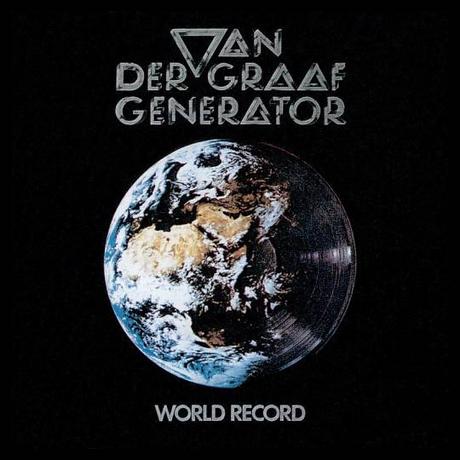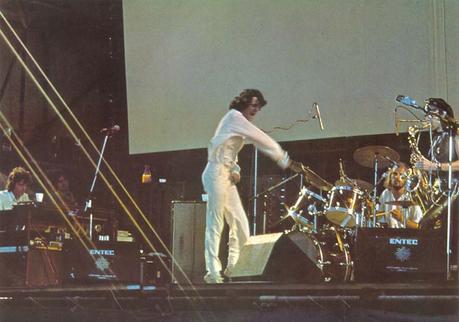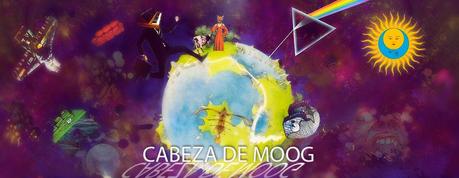
#Musicaparaelencierro. José Ramón nos revive otra de los notables registros de Van der Graaf Generator, y esta vez con el que es quizás el álbum más áspero y difícil de toda la obra vandergraftiana, y tanto es así que bien podría entrar en nuestro catálogo de discos para amar o para odiar sin términos medios. Experimental, complejo, oscuro, vanguardista, filosófico, ecléctico, intrincado, metafórico, incluyendo retazos de "música del mundo" y sinfonismo, improvisaciones, juegos de tempos, en fin, toda una batería de elementos que se reúnen casi de manera mágica para el despliegue de la más increíble lírica hamilliana. Un disco que no es un "clásico" del grupo pero sí es un disco, aún hoy, para descubrir, en un aspecto que lo asemeja en más de una faceta a los trabajos más crípticos de Tool. Aquí, un trabajo lleno de secretos y elementos ocultos, para investigar y maravillarse. Al fin y al cabo, es otro disco de una de las mayores bandas que ha dado el rock.
Artista: Van der Graaf GeneratorÁlbum: World Record
Año: 1976
Género: Progresivo ecléctico
Duración: 52:13
Nacionalidad: Inglaterra
 Algo que viene a engrosar nuestra colección vandergraftiana. Y siempre es un placer escucharlos y tener algo más de estos magníficos desgraciados.
Algo que viene a engrosar nuestra colección vandergraftiana. Y siempre es un placer escucharlos y tener algo más de estos magníficos desgraciados.No será su mejor disco, pero igual son unos genios y un grupazo. Espero sepan disfrutarlo.
Como parte de la ola creativa que produjo cuatro LP's en menos de dos años, este sería la obra póstuma de la formación clásica del grupo. Tras su publicación Hugh Banton saldría del grupo alegando desacuerdos en la manera de adjudicar los créditos y poco después saldría también David Jackson. Este es por mucho el disco más experimental de los cuatro y como todo album que se aparta de la manera común de hacer música tiende a tener críticas dispares, hay quien lo encuentra insoportable y hay quien lo considera una obra maestra. Lo que sí es cierto es que es lo suficientemente complejo para hacer inconveniente la crítica basada en criterios simplones como las que aparecen en Progarchives.Pantagruel
Siguiendo el esquema del album anterior del grupo, lo forman también tres piezas en la cara A y dos en la B, una de las cuáles es notablemente más larga que las demás. Sin embargo es un disco muy diferente en su contenido. El tema más filosófico es precisamente el más largo con el que se abre la cara B, los demás temas fueron en su día tildados de ser más ligeros, lo cual no deja de ser una simplificación burda. El resultado está lejos de ser música vanal. De hecho algunas de sus letras resaltan por la perfección técnica de los versos, independientemente de los temas que abordan, que además no guardan relación aparente con el título del LP, lo bastante neutro para no tener un significado concreto más allá del mero juego de palabras.Posiblemente sea este el disco más difícil de VdGG, con sonidos vanguardistas mezclados con guiños a música regional- concretamente música española, valses, reggae, etc.- todo con el sonido peculiar de un grupo de rock que no usa bajo eléctrico y cuyo saxofonista toca dos saxos simultáneamente. Ningún instrumento usa un timbre que sea común al genero, de hecho puedo decir que no he oído ningún otro disco que suene como éste.
El disco comienza con sonidos elctrónicos extraños mezclados con improvisaciones de un saxofón en registro alto y una batería en contratiempo, un pasaje tan intrincado que es prácticamente imposible de reproducirse, tras el cual los pedales de bajo presentan el tema musical y se oye la voz de Hammill pronunciando una de las palabras clave de todo el disco:
"Slooooow..."
Hay quien dice que "When She Comes" es una simple canción de amor, qué va. ¿Quién es 'The Lady with the skin so white'? ¿Es una metáfora de la muerte o es solo la noviecita santa del cantante? Increíblemente Hammill hace encajar a la perfección versos de diez sílabas en un patrón de quince notas y un silencio en tiempo impar, pero además los versos van encabalgados para hacer énfasis en ciertas palabras (por ejemplo 'mercy', o 'swear', o casi al final 'without mercy'). Hace además énfasis en el carácter latino incluyendo muchas palabras con raíz grecolatina - o directamente en francés- e incluye un pasaje reminisente de música española, castañuelas incluidas, interrumpido por el brillo triunfal del órgano que vuelve al tema principal, que sin embargo desemboca en un verso que expresa todo lo contrario ("easy bargain, easy crossboard, easy life").
El segundo corte, "Place to Survive" es lo más rítmico y directo que grabaron desde "Scorched Earth", tambien con una visión apocalíptica similar aunque un poco más socarrona ("while the Holocaust rages around you be the eye of the storm"). Los versos y el fraseo de Hammill a pesar del ritmo tan marcado se desdoblan de manera por demás elegante por la combinación de consonantes líquidas, otra característica poco usual de los versos en inglés. Finaliza con un pasaje memorable de saxofones doblados o cuadruplicados, órgano Hammond y una batería frenética.
La siguiente, una canción en parte sobre la hipocresía ("...a man who hides behind a mask behind a mask"). La melodía esta vez es conducida por Jackson con su registro más dulce, rompiendolo justo cuando la letra expone la verdadera naturaleza del protagonista ("sometimes when he wakes he feels he is walking through a dream"). Los versos nuevamente encabalgados y nuevamente haciendo énfasis en palabras como 'tears' fuera de la rima.
Es al dar vuelta al disco cuando viene el plato fuerte, una canción introspectiva dedicada a la guitarra de Hammill, ("my only friend"). Un inicio de órgano muy similar al inicio de "Contrapunti" de Le Orme (casi del mismo año) en ritmo lento se acelera solo cuando la batería marca un tempo más vivo y suena otro teclado (posiblemente el famoso HB6, un órgano modificado por Hugh Banton) y la explosión de la guitarra cuando se presenta el tema central y la voz de Hammill se queja: "These days I mainly just talk to plants and dogs". Los versos ahora son endecasílabos perfectamente medidos.
En el climax de la canción la voz de Hammill se dobla y distorsiona para expresar la desesperación de una situación sin remedio: "...and this is just what you choose to be, fool!"
Y tras los acordes de una guitarra triste el personaje expresa su último deseo ("one day I hope that I'll arrive") seguido de un largo pasaje lento y tedioso en ritmo de reggae con improvisaciones de saxo y guitarra. Es claro que si lo que expresa la canción es el aburrimiento de una existencia sin sentido el pasaje sea largo- más de diez minutos- y monótono, decir que este pasaje debería ser editado es en mi opinión perder la perspectiva de lo que se intenta expresar.
Finalmente, "Wondering" es una especie de himno guiado principalmente por el órgano y coros (todas las voces las canta Hammill) que habla una vez más de ese deseo de salvación insatisfecho en la canción anterior, especialmente significativo por venir inmediatamente a continuación del pasaje instrumental de "Meurglis III". Un final de aire similar al de "Still Fife".
Detalles como estos se multiplican a lo largo de todo el disco y son difíciles de identificar con pocas escuchas, de hecho el sonido de este disco cambia mucho de una edición a otra por todos los detalles que esconde, así como cuando se escucha con equipos de sonido de calidad diferente. Por esta razón este disco es en general muy poco apreciado, no es una obra que pueda juzgarse superficialmente.
The mid 70's era VAN DER GRAAF is my personal favourite and "World Record" is a clear mark of genuis from this dark progressive rock band. "World Record" is the third in the trilogy of 1975/1976 "come-back" VDGG albums (following both "Godbluff" and "Still Life") and still contains the classic line-up of HAMMILL-Banton-Evans-Jackson. Again this album is full of dark and deep melodies as told thru the slightly clogged vocals of Peter HAMMILL. The centerpiece of the album is the epic Meurglys III (The Songwriter's Guild) which stands today as stil one of my most beloved VDGG tracks. All tracks are great and I think HAMMILL's vocals are likely at his best here with even some electric guitar playing !. Some of the melodies on this album are the best they have recorded including the emotional track "Wondering" which concludes this album. I guess at 52 Mins and for vinyl this was a longer play... and well worth it... as I said a mark of genius.James Unger
The first 3 tracks are pretty strong, but after that it starts to unravel.Phil McKenna
"Meurglys III (The Songwriter's Guild)" would've benefitted from some MAJOR editing. The long reggae jam was NOT a good idea as it lapses into tedium very quickly, plus, Hammill should've never been allowed anywhere near an electric guitar (his lead playing is just AWFUL!). "Wondering" isn't bad, but really great either.
After two quickly succeeding masterpieces, VdGG went back in the studio, but this time, they would actually deny the "Never two without three" saying and head for the "Two out of three ain't bad". While still a worthy Graaf album, World Record (with a stunning artwork again on a single sleeve) is clearly a step away from the right direction.Sean Trane
Clearly (and quite unfortunately), it appears that Graaf's inventivity and inspiration had come to the end, and the quartet will once again go their separate ways after this album. The first side of the vinyl is filled with rather short tracks, none of which would've made the cut on the previous albums, but in no way are they fillers, I insist! Just tracks that fail to have as good ideas as before, like if all of them ideas had been used on the previous two albums.
However, on the second side of the vinyl, there stands a monster track Meurglys III (Hammill's guitar spirit) with an incredible descending crescendo, and clearly the highlight of the album. However, the track does overstay its welcome a bit too much as the reggae jam is simply a bit too long and highlights Hammill's (relative) weakness as an electric guitar player, but overall, if this track had been shorter by five minutes, it might have a been Graaf's crowning achievement (with Lighthouse). Please note Italian group Germinale will record an astounding cover, but more succinct) on their second album.
Still a typical VdGG album, just not as strong as the previous five albums, every with will still find this album a must-have. Unfortunately, the group will implode (due mostly to exhaustion), leaving Hammill to suppress the Generator part of their name and find old mate, Potter, keeping Evans and and enlisting Smith on violin, for a drastically different sound. But this isz another story
World Record completed the last trio of the 'classic' Van Der Graaf Generator albums from the 70's although it's not quite up to pair with Pawn Hearts or Godbluff but still very good nevertheless. Musically, it continues the style that Godbluff and Still Life had though perhaps a bit more hit'n'miss unfortunately, but it's rarely boring and it contains several wonderful and typical VDGG hooks. Solid performance both technically and compositionally with the "Meurglys III" suite being a standout here despite it's reggae jam ending wich is not bad at all, just a bit out of place here. If you like either Godbluff or Still Life then pick this one up! 4/5Björnar Lunde
This is a review of remastered version of "World Record".Peter Eisenburger
The mood of this record is dark and melancholy. Every single song reminds me of November (the birth month of Peter Hammill), though incomprehensible it was recorded in the month of May (my birth month). The dominating mood is farewell here. The forthcoming third split of Van der Graaf Generator and the forthcoming separation of Peter from his longtime girl-friend already show up on the horizon.
The remastering of the record is most pleasing, though in some savage passages Peter's roaring voice couldn't be made as clear as the instruments out of technical reasons.
The most interesting two songs are "When She Comes", which I see as a kind of follow-up to "La Rossa" in Peter's personal love affair, and the over 20 minutes long "Meurglys III, The Songwriter's Guild", a perfect fusion between Rock, Blues and Jazz. Peter excels on electric lead guitar here. (Funny, but "Meurglys III" always reminded me of "I want you / She's so heavy" by The Beatles.)
The year 1976 was incredible creative for Peter Hammill. He wrote the songs for "World Record", each one of high quality. In the same year he wrote and produced his stunning solo album "Over".
Comparing the two albums I always found the mood of "World Record" depressing and the mood of "Over" liberating.
Both have the same topics: split, leave-taking and wrench. In some of the songs of "World Record" Peter Hammill tries to generalize these themes into reflections of typical human behaviour, above all in "Masks" and in "A Place to Survive". Peter explained that from time to time he wrote songs that suited the band. These couldn't be about his own traumata in a too personal way.
On the other hand the solo album is uncompromising personal and though pain and hurt are even more obvious and in some songs nearly unbearable, it has a more optimistic feeling. Because it's "Over". "I'll see you on the wedding / I'll see you on the other side".
The two bonus tracks bring "When She Comes" and "Masks" again - this time from the BBC Peel sessions. Deripped from even the small overdubs of the official production these tracks show the wonderful structures of the music of Van der Graaf Generator.
The booklet is again extensive and of high quality but to fifty percent redundant with the booklets of "Godbluff" and "Still Life". -
IMO the last "real" Van der Graaf album of their classical period in the 70s.
So here it comes, the album that completed the trilogy of Van der Graaf Generator's second era. The main virtue of "World Record" lies in the instrumentation, which bears a more powerful vibe than on any of the two preceding gems ("Godbluff" and "Still Life"), but the main shortcoming comes as a real handicap for the opportunity to make a third masterpiece in a row. That shortcoming is the unevenness of the material - yes, the material is not as strong as to comply the VdGG standards regarding energy, drama and sonic adventure. It is not that the material is terrible or mediocre per se, but you cn tell that there is an exhaustion in the musical vision generated in Hammill's mind and portrayed by the band as a unit. Once again, the unit works very well as an ensemble, but definitely it is very obvious that their instrumental interactions are more robust than most of the musical ideas that are perfomed and delivered. The delivery outdoes the delivered item. 'When She Comes' kiccks off the album with a weird intensity built on a crescendo that gets to its first pinnacle for the first chorus, and onwards, we can feel a reasonable yet not especially amazing set of arrangements around the main motifs. The follower 'A Place to Survive' is a real rocker, seasoned with a slight yet noticeable touch of R'n'B: it is a very pleasant number, following a trend not too common for VdGG standards, that is, an energetic rocker based on dual riffs of guitar and organ and expanding on a constant tempo. Sure Hammill did stuff like this in his solo albums, but this is the first time that VdGG patently approaches a less complex side of avant prog. Actually, less complex doesn't mean comfortable, and the guys can really stir things up in a creative wy while the track goes on and on until its final fade-out, 9+ minutes later. The album's first half finds its apex with 'Masks', a typical Hammillesque angry ballad regarding the limitations of the ego - this track wouldn't have been out of place in any of the two preceding albums, with its ceremonious main motif, magical sax flourishes and a nice shift of tempo and ambience in the interlude. 'Meurglys III' is the album's monster track, but unlike other very long VdGG pieces, this one drags and meanders for too long: had it included more lyrics and had the instrumental sections been more concise, VdGG wouldn't have needed to take 20 minutes to say whatever they intended to. The long reggae coda is only a symptom of the band's overall exhaustion: by the time the listener gets here, they can already tell that this suite lacks something big. But tha tdoesn't happen at all with 'Wondering', which has to be one of the most beautiful VdGG songs ever. Originally composed by Banton and with added religious lyrics by Hammill, this powerful, moving manifesto of clever agnosticism at the gates of death delivers an eerie mixture of Gothic-like organ textures and classy adornments on flutes and saxes, giving a proper mood for Hammill's expressions. A great ending for a not so great album - still, "World Record" deserves a good place in a good prog collection.César Inca
Habría muchos otros comentarios, pero ni caso, estos tipos son inigualables por más que digan lo que quieran. Gracias Jorge por permitirnos disfrutar de este gran disco.
Lista de Temas:
1. When She Comes
2. A Place to Survive
3. Masks
4. Meurglys III, The Songwriter's Guild
5. Wondering
Alineación:
- Peter Hammill / vocals, guitars, pianos
- Hugh Banton / organs, bass pedals and guitars, mellotron, piano
- Guy Evans / drums and percussion
- David Jackson / saxes, flute

